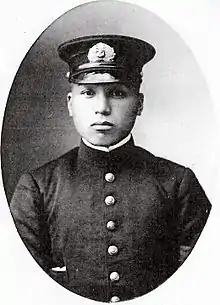Shunji Isaki | |
|---|---|
 | |
| Born | 5 February 1892 Fukuoka Prefecture, Japan |
| Died | 12 July 1943 (aged 51)[1] Kolombangara, Solomon Islands |
| Allegiance | |
| Service/ | |
| Years of service | 1914–1943 |
| Rank | |
| Commands held | Nara, Kuri, Ashi, Asanagi, Yūnagi, Shikinami. Sendai, Mogami, Jintsu, Maya 2nd Destroyer Squadron |
| Battles/wars | World War II |
Shunji Isaki (伊崎 俊二, Isaki Shunji, 5 February 1892 – 12 July 1943) was an admiral in the Imperial Japanese Navy during World War II.
Biography
Isaki was a native of Fukuoka prefecture, and a graduate of the 42nd class of the Imperial Japanese Navy Academy in 1914. He was ranked 23rd in a class of 117 cadets.
As midshipman, Isaki served on the Soya and Kashima. After his commissioning as sub-lieutenant on 13 December 1915, he was assigned to the Chikuma and Hirado, but did not participate in any combat operations during World War I.
After the war, he returned to school to study the latest techniques in naval artillery and torpedo warfare, and subsequently served on the Yamashiro, Yakumo and Hiei. As a lieutenant specializing in torpedoes, he then served on the Yubari and Sendai.
His first command was the destroyer Nara from 1 November 1926. Promoted to lieutenant commander a month later, he subsequently was captain of the Kuri, Ashi, Asanagi, and Yūnagi, and Shikinami. After his promotion to captain in 1936, he was reassigned to command the Sendai in 1938, followed by the Mogami, Jintsu, and Maya.
Isaki was promoted to rear admiral on 1 November 1942.
He commanded a destroyer squadron, DesRon2 from his flagship Jintsu during the Battle of Kolombangara against the Royal New Zealand Navy and the United States Navy on 12 July 1943. Although the battle was a victory for Japan, Jintsu was hit repeatedly by gunfire and torpedoes, destroying its bridge and killing Isaki.
Isaki was posthumously promoted to vice admiral.
References
Notes
- ↑ Nishida, Imperial Japanese Navy.
Books
- Crenshaw, Russell Sydnor (1998). South Pacific Destroyer: The Battle for the Solomons from Savo Island to Vella Gulf. Naval Institute Press. ISBN 1-55750-136-X.
- D'Albas, Andrieu (1965). Death of a Navy: Japanese Naval Action in World War II. Devin-Adair Pub. ISBN 0-8159-5302-X.
- Dull, Paul S. (1978). A Battle History of the Imperial Japanese Navy, 1941-1945. Naval Institute Press. ISBN 0-87021-097-1.
- Fuller, Richard (1992). Shokan: Hirohito's Samurai. London: Arms and Armour Press. ISBN 1-85409-151-4.
- Hara, Tameichi (1961). Japanese Destroyer Captain. New York & Toronto: Ballantine Books. ISBN 0-345-27894-1.
- Lacroix, Eric; Linton Wells (1997). Japanese Cruisers of the Pacific War. Naval Institute Press. ISBN 0-87021-311-3.
- Kilpatrick, C. W. (1987). Naval Night Battles of the Solomons. Exposition Press. ISBN 0-682-40333-4.
- McGee, William L. (2002). "Operation TOENAILS". The Solomons Campaigns, 1942-1943: From Guadalcanal to Bougainville--Pacific War Turning Point, Volume 2 (Amphibious Operations in the South Pacific in WWII). BMC Publications. ISBN 0-9701678-7-3.
- Morison, Samuel Eliot (1958). Breaking the Bismarcks Barrier, vol. 6 of History of United States Naval Operations in World War II. Castle Books. 0785813071.
- Parkin, Robert Sinclair (1995). Blood on the Sea: American Destroyers Lost in World War II. Da Capo Press. ISBN 0-306-81069-7.
- Roscoe, Theodore (1953). United States Destroyer Operations in World War Two. Naval Institute Press. 0870217267.
External links
- Nishida, Hiroshi. "Imperial Japanese Navy". Archived from the original on 30 January 2013. Retrieved 25 February 2007.
- Parshall, Jon; Bob Hackett; Sander Kingsepp; Allyn Nevitt. "Imperial Japanese Navy Page (Combinedfleet.com)". Retrieved 14 June 2006.
- O'Hara, Vincent. "Imperial Japanese Navy Page (Combinedfleet.com)". Battle of Kolombangara. Retrieved 14 June 2006.
- Chen, Peter. "WW2DB: Solomons Campaign". World War II Database. Archived from the original on 23 March 2006. Retrieved 14 June 2006.